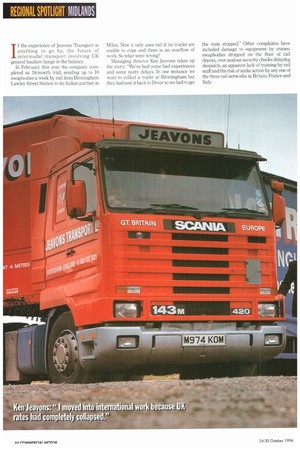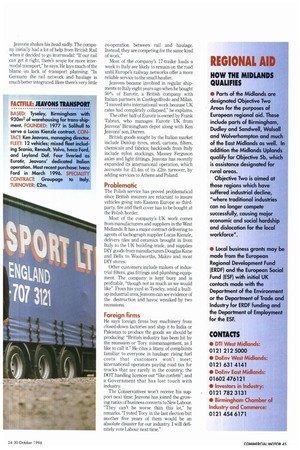REGIONAL SPOTLIGHT MIDLANDS
Page 46

Page 47

If you've noticed an error in this article please click here to report it so we can fix it.
If the experience of Jeavons Transport is anything to go by, the future of intermodal transport involving UK general hauliers hangs in the balance.
In February this year the company completed an 18-month trial, sending up to 10 swapbodies a week by rail from Birmingham Lavvley Street Station to its Italian partner in Milan. Now it only uses rail if its trucks are unable to cope and there is an overflow of work. So what went wrong?
Managing director Ken Jeavons takes up the story: "We've had some bad experiences and some nasty delays. In one instance we went to collect a trailer at Birmingham but they had sent it back to Dover so we had to get the train stopped." Other complaints have included damage to equipment by cranes, swapbodies dropped on the floor of rail depots, over-zealous security checks delaying despatch, an apparent lack of training by rail staff and the risk of strike action by any one of the three rail networks in Britain, France and Italy.
Jeavons shakes his head sadly. The company initially had a lot of help from British Rail when it decided to go intermodal: "If our rail can get it right, there's scope for more intermodal transport," he says. He lays much of the blame on lack of transport planning. "In Germany the rail network and haulage is much better integrated. Here there's very little co-operation between rail and haulage. Instead, they are competing for the same kind of work."
Most of the company's 17-trailer loads a week to Italy are likely to remain on the road until Europe's railway networks offer a more reliable service to the small haulier.
Jeavons became involved in regular shipments to Italy eight years ago when he bought 50% of Eurotir, a British company with Italian partners in Castlegoffredo and Milan. "I moved into international work because UK rates had completely collapsed," he explains.
The other half of Eurotir is owned by Frank Tabran, who manages Eurotir UK from Jeavons' Birmingham depot along with Ken Jeavons' son, Darren.
British goods sought by the Italian market include Dunlop tyres, steel, cartons, filters, chemicals and fabrics; backloads from Italy include nylon stockings, Massey Ferguson axles and light fittings. Jeavons has recently expanded its international operation, which accounts for £1.4m of its £2m turnover, by adding services to Athens and Poland.
The Polish service has proved problematical since British insurers are reluctant to insure vehicles going into Eastern Europe so thirdparty, fire and theft cover has to be bought at the Polish border.
Most of the company's UK work comes from manufacturers and suppliers in the West Midlands. It has a major contract delivering to agents of tachograph supplier Lucas Kienzle, delivers tiles and ceramics brought in from Italy to the UK building trade, and supplies DIY goods from manufacturers Douglas Kane and Bells to Woolworths, Makro and most DIY stores.
Other customers include makers of industrial filters, gas fittings and plumbing equipment. The company is kept busy and is profitable, "though not as much as we would like". From his yard in Tyseley, amid a builtup industrial area, Jeavons can see evidence of the destruction and havoc wreaked by two recessions.
He says foreign firms buy machinery from closed-down factories and ship it to India or Pakistan to produce the goods we should be producing "British industry has been hit by the recession or Tory mismanagement, as I like to call it." He cites a litany of complaints familiar to everyone in haulage: rising fuel costs that customers won't meet; international operators paying road tax for trucks that are rarely in the country; the DOT handing licences out "like confetti"; and a Government that has lost touch with industry.
The Conservatives won't receive his support next time; Jeavons has joined the growing ranks of business converts to New Labour. "They can't be worse than this lot," he remarks. "I voted Tory in the last election but another five years of them would be an absolute disaster for our industry. I will definitely vote Labour next time."




















































































































